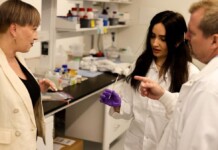Because of its active cultures and probiotics, yogurt is one of those foods that can facilitate a healthy gut microbiome for most people. Now an intriguing comparison study offers more incentive to grab yourself a Chobani or Fage, as soon as possible.
Researchers have found a significant difference in the gut microbiota of men with prostate cancer, compared with those who had biopsies that turned out benign (negative).
A collection of trillions of microorganisms live in the human belly, both good and bad. The immune system and other bodily processes are intimately affected by the balance in the gastrointestinal tract.
The state of gut microbiota can fuel the growth of tumors or make them resistant to therapy, and they’re also associated with diseases—even inside organs that are far from your intestines. But their role in prostate cancer is not understood.
Scientists in Finland at the University of Turku used samples collected from patients in a clinical study, and sequenced the gut microbiota of 181 men who were suspected to have prostate cancer. The samples were collected at the time of their prostate biopsies after MRI scans.
RELATED: New Study Finds Probiotics Dramatically Reducing the Symptoms of Depression
60 percent of the men were diagnosed with prostate cancer, and their gut microbiota profiles were significantly different to those who had benign biopsies.
The men with cancer had increased levels of Prevotella 9, Erysipelotrichaceae and Escherichia-Shigella (bacteria that produces illness and diarrhea).
They also had lower levels of the microbes Jonquetella, Moryella, Anaeroglobus, Corynebacterium and CAG-352.
Prostate cancer is the most common male cancer globally, but varying rates in different parts of the world are little understood. It is known to be hereditary and is common in most Western countries, while less common elsewhere.
The findings were presented at the European Association of Urology annual congress (EAU22) this week in Amsterdam.
“This is a striking finding from a well-conducted trial,” said Lars Dyrskjøt Andersen, Professor of Molecular Medicine at Aarhus University, and member of the EAU22 Scientific Congress Committee of Urology.
“We should be careful with observed associations when it comes to complicated epidemiology, and no cause-and-effect measures can be determined based on this, but certainly the gut microbiota could be an important area to investigate further to enhance our understanding of prostate cancer risk.”
“More research is needed to look at the potential for using gut microbiota for both diagnostic and preventive strategies,” said the study presenter, Professor Peter Bostrom.
SHARE a Spoonful of Yogurt-Love on Social Media…




















